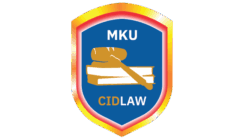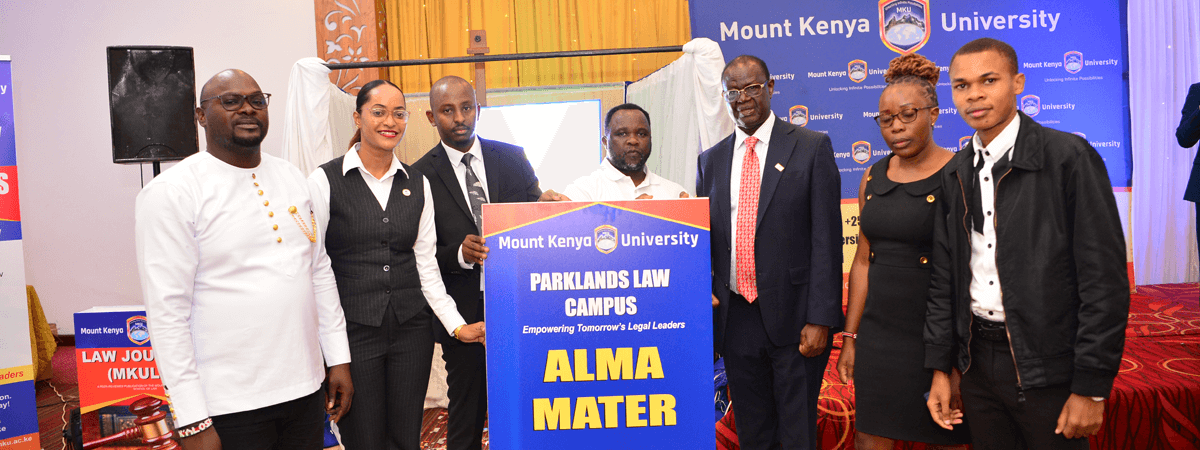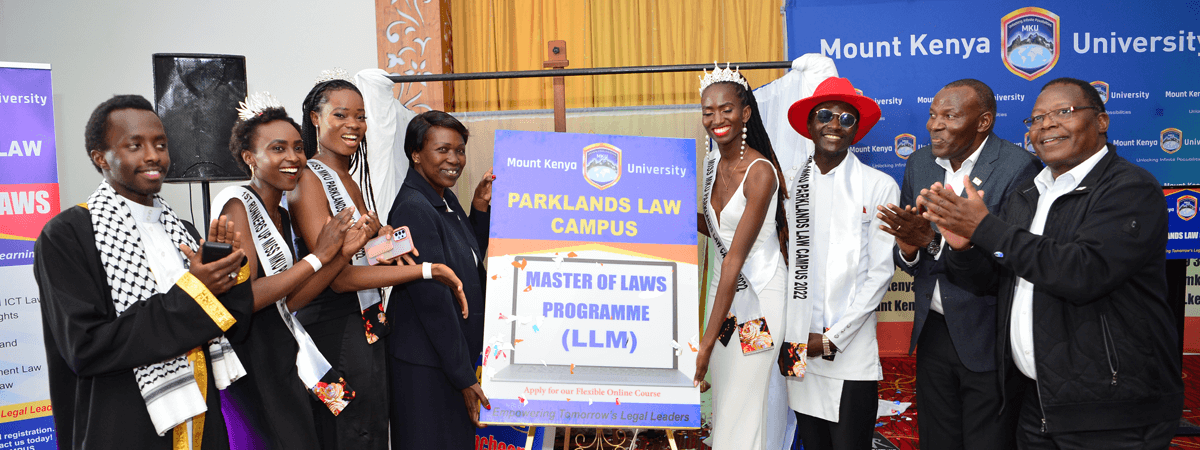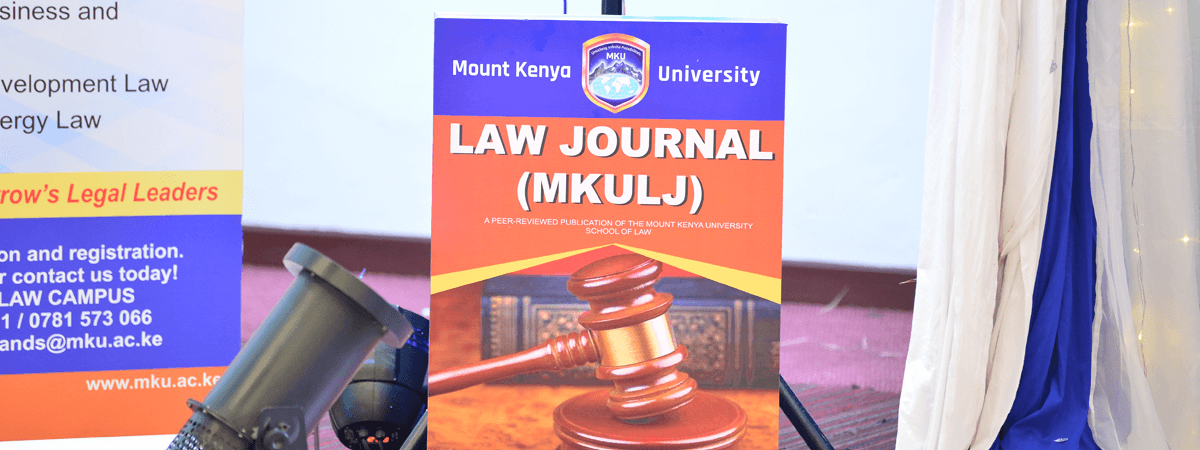
Mount Kenya University’s Centre for International and Development Law (CIDLAW) serves as a hub for legal research, education, and policy innovation aimed at sustainable development.
Origin and Evolution: Established in 2019 at Mount Kenya University’s Parklands School of Law, the Centre for International and Development Law (CIDLAW) was founded to advance scholarly research and training in international and development law. Over the years, it has evolved into a vibrant regional hub for legal knowledge and capacity building. CIDLAW has organized numerous public lectures and legal forums, facilitated law student exchange programs, hosted both local and international moot court competitions, carried out pedagogy training for staff and forged partnerships with institutions worldwide. Notably, the Centre introduced a Certified Secretary (CS) professional course in collaboration with KASNEB, enhancing corporate governance training within the University. Through these activities, CIDLAW plays a pivotal role in MKU’s mission to promote academic excellence, innovation, and community engagement in the legal domain.
Vision, Mission & Core Values
- Vision: To be a premier legal knowledge hub that advances international and development law through transformative research, education, training, and strategic partnerships.
- Mission: To advance legal scholarship and professional practice in international and development law by conducting cutting-edge research, delivering high-quality education and training, and forging strategic partnerships.
- Core Values: CIDLAW upholds Quality & Relevance, Commitment, Collegiality, Innovation, and Creativity in all endeavours. These values reflect a dedication to impactful scholarship, ethical practice, teamwork, and forward-thinking approaches in legal education and research.

Core Focus Areas & Programs
CIDLAW’s work spans several key areas that together fulfill its mandate:
- Research & Policy Reform: Conducting rigorous research on emerging issues in international and development law, producing scholarly publications (e.g., journals, policy briefs), and providing evidence-based policy recommendations.
- Education & Training: Providing high-quality legal education and capacity-building programs. CIDLAW supports postgraduate studies and offers specialized short courses and professional certification programs (for example, arbitration and mediation training, corporate governance courses like the CS certification).
- Public Engagement & Outreach: Hosting public lectures, seminars, and webinars to engage the wider community on critical topics in international and development law. CIDLAW organizes periodic forums that bring together students, practitioners, and experts, fostering dialogue and awareness on legal issues that affect society.
- Knowledge Dissemination: Sharing legal knowledge through diverse platforms using innovative tools like virtual lectures to widen access to information about CIDLAW’s work.
- Networking & Collaboration: Building a broad network of collaborations with law faculties, international organizations, professional bodies, and industry. CIDLAW leverages Memoranda of Understanding (MoUs) to undertake joint research projects, co-sponsor training programs, and facilitate student exchanges and internships. These strategic partnerships expand the Centre’s global reach and resource base.
- Alumni Engagement: Nurturing a vibrant community of alumni who remain active in CIDLAW’s initiatives. The Centre runs an Alumni networking dinner, a vibrant WhatsApp group with over 900 members from the School of Law, Mentorship Program pairing current students with experienced graduates during legal aid forums. Alumni are encouraged to contribute to research and training and to act as ambassadors of CIDLAW in their professional spheres.
Collectively, these programs enable CIDLAW to fulfill its objectives of research excellence, quality training, community engagement, and knowledge leadership in international and development law.
Strategic Partnerships & Collaborations
CIDLAW actively collaborates with both local and international partners to enhance its impact. Key partners include the Chartered Institute of Arbitrators (CIArb), the Institute of Certified Secretaries (ICS), the International Law Institute – African Centre for Excellence (ILI-SACE), the East African Law Society (EALS), KASNEB, and the Kenya Red Cross Society, Mount Kigali University – School of Law among others. These collaborations enable joint conferences, specialized trainings, student internship opportunities, exchange programs, and exchange of expertise. Through such partnerships, CIDLAW amplifies its global engagement, connecting academia, industry, and civil society in addressing legal challenges. The Centre’s partnership network continues to grow, positioning it as a locus for international cooperation in legal research and capacity building.
Governance & Management
CIDLAW operates within a robust governance framework aligned with university policies (see Annexure 1 for detailed structure). Oversight is provided by a CIDLAW Board (Institute Advisory Committee) established under MKU statutes. The Board comprises senior academia representatives and external experts, ensuring strategic guidance and alignment with the University’s mission and quality standards.
Day-to-day management is led by a Director of CIDLAW, who reports to the Dean of the School of Law. The Director, together with a Deputy Director, oversees all programs and operations of the Centre. A management team of department heads and support staff drives the core functions:
- Research & Publications Department: Manages research projects, scholarly publications, and academic programs, ensuring research quality and integration into teaching.
- Training & Capacity Building Department: Oversees professional courses, workshops, and continuing legal education programs, aligning them with industry needs and standards.
- Partnerships & Outreach Department: Handles external relations, including collaborations with partner institutions, organization of public events, and alumni relations, keeping CIDLAW visible and connected.
- Administration & Finance Support: Provides administrative, financial, and logistical support covering budgeting, human resources, marketing, and daily operations.
Additionally, CIDLAW may engage research fellows, program officers, and support staff (e.g., research assistants, administrative assistants, communications officers) to ensure the smooth operation of its initiatives. This governance and management structure guarantees both academic oversight (with reporting lines to the University Senate for academic matters) and operational efficiency under University management. It enables CIDLAW to pursue its mandate effectively while maintaining accountability and excellence.
Alignment with Sustainable Development Goals (SDGs)
CIDLAW’s mission and activities strongly align with global and national development priorities, notably the United Nations Sustainable Development Goals. In particular, CIDLAW focuses on:
- SDG 9 – Industry, Innovation & Infrastructure: As MKU has been appointed the UN Academic Impact hub for SDG 9 (Industry, Innovation, and Infrastructure) for 2025–2027, CIDLAW contributes by integrating legal perspectives into the innovation and infrastructure agenda. The Centre conducts research on laws and regulatory frameworks that foster industrial growth and robust infrastructure development. Through policy analysis on topics like technology law, entrepreneurship, and public-private partnerships, CIDLAW ensures that innovation and infrastructure initiatives are underpinned by sound legal frameworks. Its training programs also equip legal professionals and students with the expertise to navigate and support industry innovation and large-scale infrastructure projects.
- SDG 16 – Peace, Justice & Strong Institutions: CIDLAW’s focus on international and development law inherently advances SDG 16, which promotes peaceful and inclusive societies, access to justice, and accountable institutions. The Centre’s research on governance, human rights, anti-corruption, and the rule of law informs efforts to strengthen legal and judicial institutions. By offering legal aid forums, community legal education, and policy advocacy, CIDLAW helps build capacity for justice sector reforms and raises public awareness of rights and responsibilities. These efforts support the creation of stronger institutions and uphold the rule of law at national and regional levels.
- SDG 17 – Promoting Partnerships for the Goals: CIDLAW actively contributes to SDG 17 by fostering strong collaborations with local and international institutions. Through MoUs, joint research, and student exchanges, the Centre leverages shared knowledge and resources to advance legal scholarship. Existing partnerships with bodies like CIArb, ICS, and ILI-SACE enhance its global engagement. These collaborations reinforce CIDLAW’s role in promoting sustainable development through collective action.
In addition to the global goals, CIDLAW’s work supports Kenya’s Vision 2030, the East African Community (EAC) Vision 2050, and the African Union’s Agenda 2063, which emphasize good governance, innovation, and the rule of law as pillars of sustainable development. By training competent legal professionals, influencing policy, and fostering governance reforms, CIDLAW contributes to these national and regional development agendas.
Achievements & Strategic Direction
Key Achievements (2019–2024): Since its inception, CIDLAW has made significant strides in establishing itself as a center of excellence:
- Organized over a dozen high-profile public lectures on international and development law, featuring members from the judiciary, policymakers, and distinguished alumni.
- Hosted multiple moot court competitions providing practical advocacy experience to students and engaging the broader legal community.
- Published scholarly works including a dedicated MKU Law Journal of International and Development Law and various policy briefs, thereby enriching academic discourse and informing public policy.
- Launched the Certified Secretary professional course in partnership with KASNEB, positioning MKU as a leader in corporate governance training in academia.
- Cultivated strategic partnerships with key organizations (CIArb, ILI-SACE, EALS, ICS, among others), enhancing CIDLAW’s program offerings and international reach.
- Mentored and empowered students and young alumni through internships, moot competitions, and alumni networks—strengthening the pipeline of skilled professionals in international and development law.
Strategic Direction (Moving Forward): Building on these achievements, CIDLAW is poised for an expanded role as it transitions into an Institute:
- Program Expansion: CIDLAW plans to develop specialized additional professional courses in areas like arbitration, mediation, data protection, and anti-illicit financial flows to address emerging legal challenges.
- Policy Impact: CIDLAW will intensify its role as a think tank by engaging in interdisciplinary research that directly informs national and international policy (e.g., contributing expertise to legislative reforms or advising on treaty implementations). Increased output of policy papers and stakeholder roundtables is planned to bridge academia and real-world governance issues.
- Global Engagement: Strategically, CIDLAW aims to broaden its international collaborations, pursuing new MoUs with global law institutes and universities, UN agencies, and NGOs. This will open up more opportunities for joint research grants, faculty exchanges, and global seminars, thereby elevating MKU’s profile on the world stage.
- Innovation & Digital Presence: In line with MKU’s innovation ethos, CIDLAW will invest in digital platforms (such as a CIDLAW portal or mobile app) to increase access to its resources and continue exploring innovative teaching methods (virtual moot courts, online certificate courses) to reach a wider audience.
By following this strategic path, CIDLAW seeks to enhance its impact on legal education and development policy. Its evolution into a fully-fledged Institute will secure greater resources and autonomy, allowing it to champion the integration of law in sustainable development initiatives and to serve as a flagship entity for MKU’s commitment to the SDGs and societal progress.
Contact Information
Centre for International and Development Law (CIDLAW)
Mount Kenya University, Parklands Law School
Address: P.O. Box 13495–00100 GPO, Nairobi, Kenya
Email: cidlaw@mku.ac.ke
Phone: +254 714 920104



